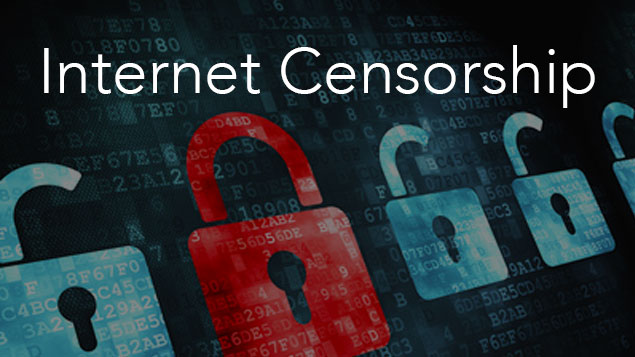The word censorship is an English term that refers to the practice of limiting, prohibiting, or suppressing in whole or any part of a publication, a book, drama, artwork, or any kind of communication from being seen, heard, or recorded.
Internet censorship with the same understanding refers to the act of limiting or regulating what individuals can view, publish, or access online. This practice can be carried out by various entities, usually governments, private institutions, or individuals, non-governmental entities, multinational organizations etc. usually driven by a range of motives such as political, ethical, religious, or commercial considerations. The concept of internet censorship is coming up for discussion among interested parties for various reasons due to its possible impact on users of the internet, society, and various categories of audiences.
Background
Until now, internet users have been captivated by the misconception that the online space operates without regulation. This belief has led to the notion that individuals can engage in unrestricted activities on the internet, particularly in terms of publishing, creating, and sharing content on various platforms, including social media.
However, an increasing number of internet users, particularly those active on social media, are surpassing ethical boundaries by posting content that may be deemed inappropriate for diverse audiences. For example, it is deemed unacceptable to share explicit images of children or disseminate content containing hate speech.
The internet serves as a vast community transcending our physical boundaries, reaching an expansive audience beyond our immediate imagination. Consequently, it becomes a fertile ground for the propagation of diverse ideologies, both constructive and detrimental, including conspiracy theories. Take, for instance, the case in Ghana, where individuals from Asia engage in illicit mining ventures within the secluded forests. Others partake in various businesses, possessing intricate knowledge about Ghana’s resources that often surpasses the awareness of the average Ghanaian. This prompts a critical inquiry: How did these individuals gain such insights if we hadn’t shared an abundance of information about ourselves with the world through the internet?
Are there countries who censor the internet?
It’s important to note that internet censorship exists to varying degrees in many countries, and the landscape is constantly evolving. Additionally, some countries may justify censorship measures based on concerns such as national security, public order, or protecting cultural values, while others may use censorship to suppress dissent or control the flow of information. The following countries censor the internet to various degrees based on their national ambitions.
China: China is well-known for its extensive and sophisticated system of internet censorship, often referred to as the “Great Firewall.” The government controls and monitors online content, blocking access to certain websites, social media platforms, and news outlets deemed politically sensitive.
North Korea: an excessively introvert country has one of the most tightly controlled and isolated internet environments. Access to the global internet is limited for ordinary citizens, and the government monitors and filters content rigorously.
Russia: The Russian government has implemented various measures to control online information, including restrictions on websites critical of the government, social media platforms, and communication tools. Laws have been enacted to regulate online content and user data.
Should the government of Ghana censor the Internet?
The question of whether the government of Ghana should censor internet use is a complex and debated issue, and opinions on this matter may vary. Arguments in favor of internet censorship often highlight concerns related to national security, public safety, and the preservation of cultural values.
Proponents may argue that certain restrictions are necessary to prevent the spread of harmful content, hate speech, or misinformation. Censorship measures could also be seen to maintain social harmony and political stability.
However, internet censorship also has many drawbacks and challenges. It can violate the human rights of freedom of expression and access to information, which are essential for a democratic society. It can also stifle innovation, creativity, and diversity of opinions on the internet, which can limit the potential of the digital economy and culture.
Internet censorship can also be abused by authoritarian regimes or corrupt entities to suppress dissent, criticism, or opposition. Furthermore, internet censorship can be difficult to implement effectively and consistently, as users can find ways to circumvent it through encryption, proxy servers, or VPNs.
The author advocates for the implementation of a law by the Ghanaian government, empowering relevant authorities to determine, under specific conditions, the areas of the internet that may necessitate censorship and the appropriate timing for such measures. An example is the importance of restricting individuals from openly sharing certain national resources on the internet. This censorship aims to prevent excessive information disclosure to foreign entities who might exploit these resources to the detriment of our citizens.
Conclusion
Therefore, internet censorship is a complex and controversial issue that requires careful consideration and balance. It should not be imposed arbitrarily or excessively, but rather based on clear and transparent laws and regulations that respect human rights and democratic values. It should also be subject to oversight and accountability by independent bodies and civil society. Internet users should also be aware of their rights and responsibilities online, and exercise critical thinking and media literacy when accessing or sharing information on the internet.
Author: Elolo Alfred Konglo | Head, IT Infrastructure Unit, Ho Technical University | Member, IIPGH.
For comments, contact ekonglo@htu.edu.gh or 0244304540
















